Hannah Byron's Blog, page 9
September 11, 2022
Operation Dynamo or the Dunkirk Evacuation
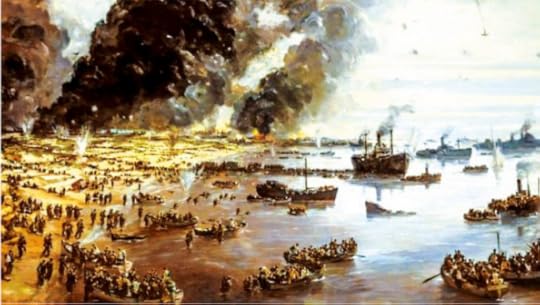
Impression of the Dunkirk Evacuation
Introduction
The official start of World War 2 in Western Europe was 1 September 1939, when Hitler invaded Poland. It immediately sent the Western front on alert. The Belgium and French forces, including the British Expeditionary Force (BEF), prepared for an invasion by protecting the borders with Germany, particularly in Belgium and France.
However, it wasn't until after the long winter of the Phoney war was over, in April 1940, that Hitler's armies spread like an oil spill over the rest of Europe. First, the Germans conquered the Northern countries, Denmark, and Norway. Then starting on 10 May 1940, Holland, Belgium, and Luxembourg were quickly overrun.
The German advance was carried out by two armies. A smaller army swept through Holland and Belgium straight into northern France. Most of the Allied forces hurried north to stop it.
The main German force advanced through Luxembourg, broke through the French lines at Sedan, and sped across northern France to the coast. They moved so fast with such an overkill of armoured columns that the Allies stood no chance. This forked German tactic cornered them on a small strip of the Belgian and French coast.
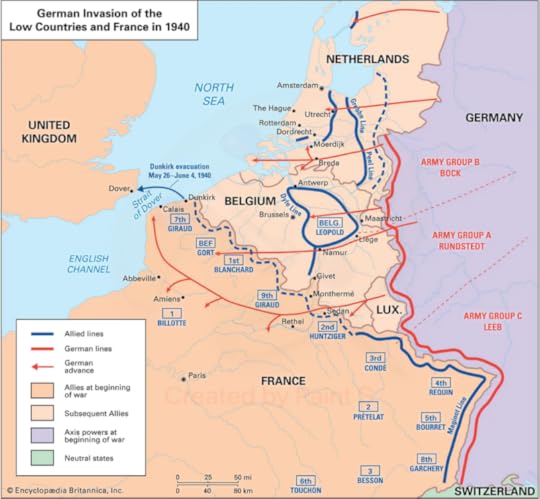
Map Blitzkrieg May 1940
Boulogne fell on 25 May and Calais the next day, leaving Dunkirk the only place still in Allied hands. Was it a viable port from which the BEF and the remains of the French and Belgian armies could escape? Whereto?
What happened next was a miracle. A desperate rescue controlled from below Dover Castle saved thousands of these trapped men from the Dunkirk beaches. This spectacular evacuation undoubtedly changed the course of World War 2. Had Operation Dynamo failed, the Allied cause in Europe would have been lost in May 1940 and Great Britain would - most likely -have had to surrender.
The Dunkirk Evacuation has gone down into the history books as the largest military evacuation ever.
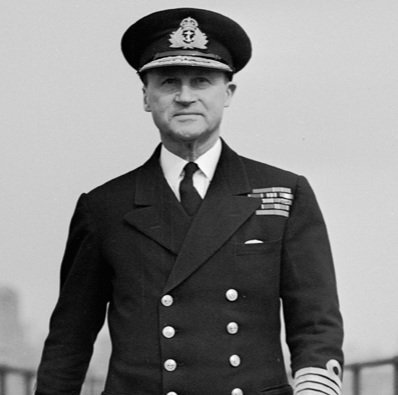
Vice Admiral Bertram Ramsey, the Savior of Dunkirk
The evacuation's organization
Operation Dynamo was the rescue operation Winston Churchill deemed inevitable. From Dover, ships had to be sent to Dunkirk to rescue the trapped men. He ordered the Royal Navy to implement what was considered an undoable operation. It was co-ordinated by Vice Admiral Bertram Ramsay, who had only a small team available underneath Dover Castle to assist him. In the network of tunnels underneath the cliffs, the nerve centre that would oversee Operation Dynamo was centered. You can still visit the Secret Wartime Tunnels today. Here is more information.
As early as 19 May, it was apparent that a rescue operation over sea was the only viable path. Ramsay and his staff at Dover had five days to arrange enough ships to assist in the BEF evacuation. On 26 May, the first convoy of ships sailed across the English Channel.
Difficulties hampering the Dunkirk Evacuation
Both on the land and in the air, the Germans had absolute authority. They were free to go wherever they wanted while the Allied forces were concentrating on defending a small pocket around Dunkirk that was under constant attack. Many thousands of soldiers were crowding the streets and buildings and beaches, the density of their nearness making them extra vulnerable to the unleashing of German air attacks and shelling.
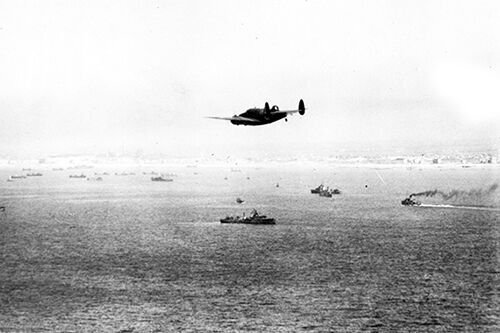


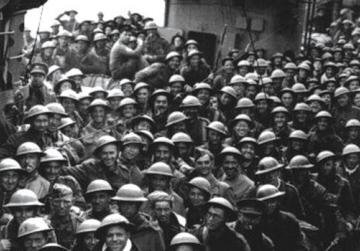
Time ran out for these men, so there was no way to organize a proper and orderly evacuation. The Allies were also impeded by the scarce means of communication between Dover, the ships, and the men in Dunkirk.
The Germans had destroyed Dunkirk's main port, from where an evacuation would have been easier. The Allies were left with two options: the mole (water break) east of the harbour, and the beaches on the north side. Neither was easy to reach. The Dunkirk beaches slope slowly into the North Sea, which meant that a destroyer could not get within one mile of the shore, even at high tide. An extra action was needed by bringing the troops to the waiting ships in small crafts.
Because of these difficulties, the start of the rescue operation was slow and arduous. On 26 May only 8,000 men could be rescued, but in the following days Operation Dynamo honored its name and gathered momentum.
The magic of the ‘Little Ships’
A pivotal role was reserved for the 'little ships' as part of the evacuation. It didn't take Admiral Ramsay and his team much time to realize that by using small vessels, they could reach the beaches and transport the waiting soldiers out to the larger military ships. By 31 May, hundreds of civilian boats, from fishing trawlers, lifeboats, tiny barges and sailing ships had responded to the Navy’s request to come forward.
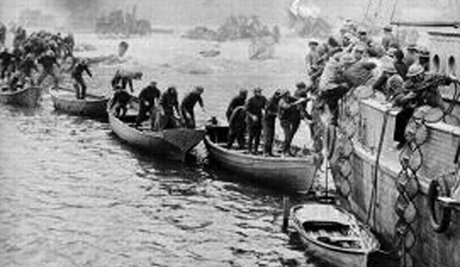
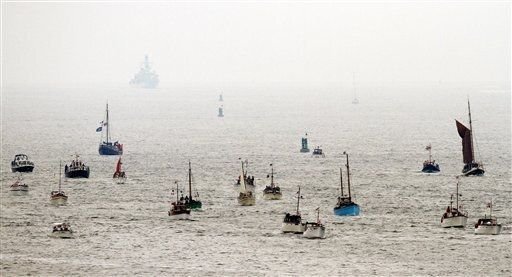
All of those heroically crossed the English Channel to Dunkirk. On some of these ships, a female crew took part, while many of the military vessels had nurses on board.
Most of these ships were crewed by volunteers, who risked life and limbs to repeatedly pick up the queuing soldiers from the beaches and in the water and ferry them to the ships that couldn't reach the coast. They were all constantly under heavy attack from enemy aircraft and artillery.
On their return to Dover, many of these smaller vessels also transported troops across the Channel. Though unmistakably important, two-thirds of the men were evacuated via the mole (239,465), while 98,761 were rescued from the beaches. Guarding the operation were the ships of the Royal Navy, destroyers, minesweepers, and requisitioned merchant vessels with naval crews. They crossed between Dover and Dunkirk many times and suffered very heavy losses.
Disaster or Victory?
The fall of Dunkirk after the evacuation and then the surrender of the whole of France in mid-June 1940, resulted in Britain basically being the only country left for Hitler to conquer. The BEF had had to abandon or destroy almost all its heavy equipment at Dunkirk. For Hitler, this was the reason to declare the Dunkirk Evacuation a victory for Germany.
But by rescuing most of its army, Operation Dynamo was Winston Churchill's first important win of WW2. Most of his trained, experienced troops were intact. Not only morale wise, the evacuation was a boost, but it also meant they had reserves to fight. Operation Dynamo became a crucial event in the Second World War. It inspired Churchill to one of his all-time famous and dramatic speeches in the House of Commons:

Churchill’s Speech after Dunkirk
“We shall go on to the end… we shall fight on the seas and oceans, we shall fight with growing confidence and growing strength in the air, we shall defend our Island, whatever the cost may be, we shall fight on the beaches… we shall fight in the hills; we shall never surrender.”
But he also said:
‘We must be very careful not to assign to this deliverance the attributes of a victory. Wars are not won by evacuations.’ Winston Churchill, 4 June 1940.
Further reading:
Articles:
9 things you (probably) didn't know about Dunkirk by James Holland
September 3, 2022
A Double September Kindle Deal & More

Both In Picardy’s Fields and The Diamond Courier are half price in the US and Canada this month!
September is such a wonderful celebration month for me and I’m licking it off with a Kindle Monthly Deal for September. The first two books in The Resistance Girl Series are half price! I’ll share the links to the two Amazons below. But first the other happy occasions.
On 20 Sept I'll be back in the writing/publishing saddle for 2 years.

The first book, In Picardy’s Fields, is inching towards 1,000 reviews/ratings, which it will pass before its 2nd birthday.

My 5th book in The Resistance Girl Series, The Highland Raven, comes out on 27 September (560 preorders and counting).

I'll be publishing my first-ever E book box of the first 4 books in the series soon. Link follows.
I'm branching out into another Historical genre. So excited! More on that soon.
Finally, and maybe most importantly, I have an amazing new business manager in the form of my eldest son. He's taking so much work out of my hands. He created the Kindle Deal graphic for me. Maybe. I'm prejudiced, but I feel it's much better than the stuff I usually make.
Okay here are the links to the September Kindle Deals. The books are also, of course, still in Kindle Unlimited. Happy reading.
Get In Picardy's Fields for $2.49 in US Get In Picardy’s Fields for $2.49in Canada Get The Diamond Courier for $2.99 in US Get The Diamond Courier for $2.99 in CanadaAugust 27, 2022
Chamberlain's Appeasement Policy and How it failed.

Neville Chamberlain making a speech after the 1938 Munich Agreement
After long deliberations with myself I’ve decided to write a serious of blogs about the political backdrop of my upcoming WW2 novel The Highland Raven (27 September), which will become as a free booklet for the readers of the new book.
IntroductionWhen Hitler came to power in 1933, the British prime minister Neville Chamberlain did everything in his power to appease the German dictator. Had he listened to another voice, that of Conservative back-bencher Winston Churchill, might history have taken a different course?
This is a rhetoric question to which we will never know the answer. But the fact remains that Neville Chamberlain has gone down into the history books as the wrong decision-maker, while Winston Churchill is our forever WW2 hero.

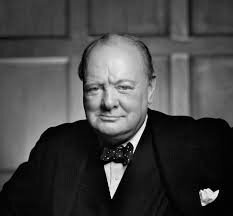
Neville Chamberlain Winston Churchill
Who was Neville Chamberlain?Arthur Neville Chamberlain (18 March 1869–9 November 1940) was the Conservative Prime Minister of the United Kingdom from May 1937 to May 1940. He is most remembered for his foreign policy of appeasement, and in particular for signing the Munich Agreement on 30 September 1938, which accepted that Sudetenland (German-speaking region of Czechoslovakia) became part of Nazi Germany.
When Hitler invaded Poland on 1 September 1939 (the beginning of WW2), Chamberlain declared war on Germany on 3 September and led the United Kingdom through the first eight months of the phoney war. Phoney, because there was no military involvement on the side of Great-Britain and Poland, was left to its own defense. Chamberlain resigned as prime minister on 10 May 1940 and was succeeded by Winston Churchill.

A conference of the League of Nations, which was doomed to fail at some point
The origin of the appeasement policyChamberlain's policy of appeasement stemmed from the failure of the League of Nations (which, by the way, the US never joined despite President Woodrow Wilson’s wish) and the failure of collective security. The League of Nations, set up in the aftermath of WW1, was based on hope. Hope that international cooperation and collective resistance to aggression might prevent another war. Members of the League could count on help from other members if under attack.
The policy of collective security included measures to achieve international disarmament and economic sanctions against an aggressor. It already showed its ineffectuality when confronted by the aggression of Hitler and Mussolini (Remilitarization Rhineland, Invasion of Abyssinia).
Note HB: writing this in 2022, I can't help but feel wry irony. See the shortcomings of the United Nations (among others) at stopping Putin's aggression in Ukraine.
It is important - also in the light of today - to understand that the British appeasement policy wasn't just a whim of a gutless politician.
In the post-Great war era, British appeasement was a popular and pragmatic approach for obvious reasons.
First, the British people wanted to avoid the slaughter of another world war at all costs. No country had suffered more casualties and equipment loss in the WW1 than the British.
Second, the country had an immense empire to rule and simply couldn't afford major rearmament costs.
Third, France, Britain's chief ally in WW1, was also seriously weakened and not ready to take on another war.
Fourthly, the support of other Commonwealth countries in yet another war with Germany was all but certain.
Finally, many Britons sympathized with Germany for various reasons. Whether they felt the country had been treated unfairly following its defeat in 1918, or they admired Hitler's rise to power and approach to getting the economy going after the 1929 Stock market crash.
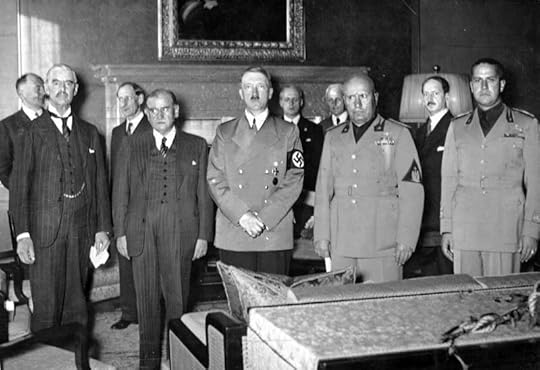
From left to right: Neville Chamberlain, Édouard Daladier, Adolf Hitler, and Benito Mussolini pictured before signing the Munich Agreement
The Appeasement policy in actionHoping to avoid war, the 1930s Britain’s overall policy comprised allowing Hitler to expand German territory unchecked. Hitler’s expansionist aims began in 1936 when he sent his troops into the Rhineland. Two years later, in March 1938, he annexed Austria.
At the 1938 Munich Conference, many British still believed that by Neville Chamberlain's decision to sign the Munich Agreement and hand over Sudetenland to Hitler, their prime minister had averted war with Nazi-Germany.
However, the Munich Agreement was not greeted with jubilation by one back-bencher in the House of Commons, Winston Churchill who at that point in his career was estranged from government and only one of the few MPs to oppose appeasement of Hitler. He described it as ‘an unmitigated disaster’.
And Hitler didn't adhere to his promise of ‘no more territorial demands in Europe’. As undeterred by the British appeasement, as by his later promises to Stalin. Dictators aren't ruled by agreements of any sorts.
In March 1939, he violated the Munich Agreement by occupying the rest of Czechoslovakia. Six months later, in September 1939, Germany invaded Poland. By then, war with Germany was inevitable, even to the most fervent appeasement supporters.
Appeasement - with hindsight - was defined as 'a policy of one-sided concessions to an aggressor state, often at the expense of third parties, with nothing offered in return except promises of better behavior in the future'.
Prime minister Neville Chamberlain sincerely believed this approach would bring a quicker end to the European crisis, as the Nazis' real demand was a revision of the Treaty of Versailles. He believed that, through negotiating a general settlement for the replacement of that treaty, Germany would again enter peaceful treaty relations with its neighbors.
Winston Churchill's warning against appeasementWhen the Nazis came to power in 1933, Winston Churchill warned against the perils of German nationalism. But the nation and the government, weary of war and reluctant to get sucked into European troubles again, largely ignored the whistle blower and did everything they could to stay out of Adolf Hitler’s way.
Though an important politician in the 1920s, Churchill had by this time become a marginalised voice, easily side-lined by Neville Chamberlain. But Winston Churchill never let go. If he believed in something so he remained the most fervent opposer of appeasement, consistently warning the government of the dangers posed by Nazi Germany. He went further to argue that faster British rearmament could deter the German dictator, and that a readiness to make an early stand against his aggression could halt Hitler’s progress before it was too late.

This map shows the parts of Europe Hitler invaded before WW2 broke out, so what Chamberlain’s Appeasement consented to.
The result of appeasementAppeasement reached its sad climax with Chamberlain's sighing of the 1938 Munich Agreement. Promising it would bring “peace in our time”, Churchill scolded him for “throwing a small state to the wolves” in exchange for a promise of peace. Churchill continued to speak the prophetic words: “You were given the choice between war and dishonor. You chose dishonor and you will have war.”
When a year, peace was shattered by Hitler's invasion of Poland and Chamberlain was forced to declare war, he showed himself unequipped for the daunting task of saving Europe from Nazi conquest.
When the British forces failed to stop the German occupation of Norway in April 1940, Chamberlain lost the support of his Conservative Party. By May 1940, the Allies were losing big time on the Western front, and then on 10 May 1940, Hitler invaded Holland, Belgium, and the Netherlands.
On that very day, Chamberlain formally lost the House of Commons' confidence and there was no other option for him but to resign. Faced with the Nazis’ unstoppable Blitzkrieg across Europe, Lord Halifax, who was assumed to succeed him but being both members of the House of Lords and of commons, refused the premiership. Churchill was the only credible alternative to lead.
Had Chamberlain's appeasement worked, and WW2 had ended before May 1940, history would now probably remember Churchill as an average First Lord with a rather embarrassing role in the failure of the Norwegian campaign. But as history has shown, this failure led to Chamberlain’s fall and Churchill's rise.
August 20, 2022
Sneak Peek The Highland Raven
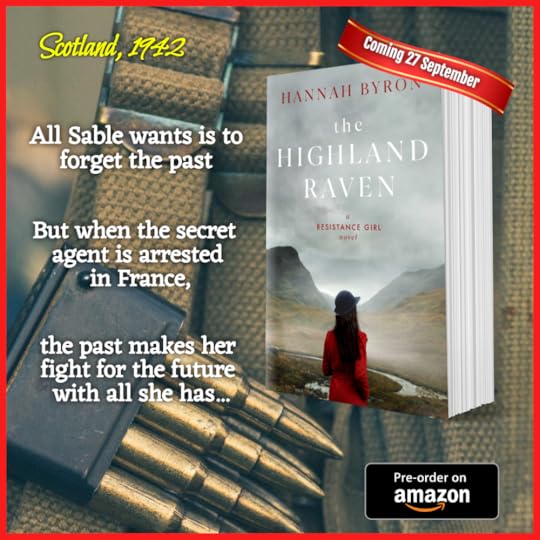
“The wound is the place where the Light enters you.”
Rumi couldn’t have written a more vivid theme for The Highland Raven. It is as if the Sufi master wrote this line with Sable Montgomery in mind. Of course, he didn’t. Duh!
Sable is so troubled and so desperate at the book’s beginning that she’s about to marry her best friend, whom she knows she doesn’t love as a partner, to get herself out of the mess she’s entangled in.
The Second World War raging in this Resistance Girl novel almost pales compared to Sable’s personal trauma. It isn’t the war Sable fears, not even death, but she’s horrified by her own past. Some parents aren’t fit to be parents - this also applies to real life, alas - and Sable’s mother, Misty Fletcher, is certainly one of those.
For an author, it is rewarding and hard to depict a character so bruised by life, especially if the character is adept at hurting others as a means of survival. I fretted Sable might be too unlikable, but if you, as the reader, keep Rumi’s quote in mind, you’ll be able to forgive Sable’s initial shenanigans. At least, I hope you will.
Here’s a sneak peek into the life of our tough cookie when she’s a SOE agent in France… (still not 100% edited!)
……………………………………………………………………………………………………….
It was a perfect night for an act of sabotage to be executed slick as a whistle. The night was dry and humid, windless, with no rain, no stars, and sufficient fog to see for those who want to see but not to be seen. The station was at half a mile away from the village town center on an elevated embankment, at a suitable distance from preying eyes.
Total silence reigned because of the curfew. Only one car rambled by on the ring road on its way to Libourne. In this remote part of France, German officers preferred to wine and dine in the nearby town of Libourne or even travel down to Bordeaux.
There was no need for night vigilance here. No one suspected anything to happen in Coutras, which made it a perfect place to destruct the Germans' vital rail artery to the south-west coast.
Sable and Freddie lay side-by-side on their stomachs on a knoll of grass surveying the Kriegslokomotive of the DRB Class 52. They were waiting for two Frenchmen of the Résistance-Fer, the so-called cheminots, who would instruct Sable in placing the explosives.
She felt it was her duty to take the responsibility for the sabotage so that the local men who worked on the French rail system would technically be in the clear. All her Beaulieu training would prove if it was ultimately useful for actual operations.
Freddie had insisted on being there with her.
"Wouldn't want to miss my blue-blooded sister dynamite a Nazi iron horse."
Sable had protested. "Why endanger both of us? There's no need, Maurice. It's a hit-and-run act and these men know what they do. One's on watch, the other checks my work. The fewer people involved, the better."
But there had been no changing Freddie's mind, so Sable had conceded and now was actually glad to have her brother near during her first big mission on her own.
The raspy croak of a night heron sounded once. Her sign. Two dark shadows crept along the railroad track, only visible to those who knew what to look for. Her cheminots, men from the village Sable had never met but trusted as underground resistance fighters. Simple workers, men, and women, who obstructed the occupiers wherever they could, as thousands of French citizens did day by day all over France. The very foundation on which her SOE could function.
"Good luck," Freddie whispered, "I'll keep my eyes peeled."
"Night owl hoot twice in case of danger." Sable whispered, as she was already crawling forwards towards the stolid locomotive, silhouetted as a massive black against the charcoal, starless sky.
No words were exchanged. The silence of the night reigned as Sable took the plastic explosives from her backpack. A tall shadow beckoned her to come closer while the other shadow went to the locomotive's front and stationed himself in the middle of the tracks, from where he could stake out the entire region.
Both at Beaulieu and again that morning, Sable had studied the various components of the steam engine so closely that she'd be able to find the red cylinder blocks low near the wheels even with a blindfold. The explosives would crack the cast iron blocks. It was vital to break this part of the engine, as the Germans didn't keep spare cylinder blocks as they hardly ever wore out on their own. The blast would not only wreck the locomotive but have enough power to deform the railroad itself.
With swift hands, she attached the innocent-looking plastic bars to the cylinders with nylon ties. The cheminot was near at hand and checked her every action. His whispered 'parfait' gave her the confidence, she was now an adroit explosive's expert. One last check and she was at the ready. The shadow insisted on giving her the all-clear she didn't need.
"Lit the wick and run as fast as your legs can carry you. You've got eighty seconds before the flame reaches the blasting cap."
"I know. You do the same. A bientôt." Sable couldn't help sounding indignant. Who was in charge of this operation?
It was the fastest eighty-seconds' run of her life. Not even bothering to check if her accomplices had also left the scene of the crime, Sable ran with all she had inside of her. Away from the village and away from the expected explosion. The team would meet at a pre-agreed place at dawn. Until then, it was everyone for themselves.
The shock waves of sound and the flames shooting high into the sky, temporarily deafened and blinded Sable but she kept running on, low to the ground, leaping like a mountain cat. The explosions were still ringing out with debris landing everywhere, but she managed to increase the distance between her and the station, away from the built areas. The blackout made lights inside houses unseen, but she heard French voices, villagers daring to withstand the curfew to see what had caused the blow-up. Dogs barked and rattled on chains. Then the siren of a fire engine sounded, coming nearer.
Her lungs burnt, her legs were as lead while her rucksack felt as if filled with fifty-stone bricks. Still, she urged herself on, not daring to stop until she would be well out of earshot and protected by the thick forest around her. Only then she allowed herself to slow down.
A blast so forceful must mean the dynamite had done its righteous, ruining job. The mission's success made Sable feel victorious, full of vim and vigor, though at the same time she was aware how odd it was to feel so pumped up after an act of destruction.
"It's what I came here for!" She reminded herself, still panting from the run, her heart thumping, and her throat dry. What a crazy day it had been!
In the forest a couple of miles west of Coutras, Sable made her bed of leaves near the shore of the Dronne River. During her SOE training, she'd taken part in a variety of survival trips, some of them for several days, with only a compass and the bare minimum to find her way back to camp.
So, sleeping in the open air and creating a warm and safe hiding place was not the issue. The only difference being that it had been in the safe homeland and not in a strange country under enemy occupation.
Knowing she would have to sleep with only half her brain, so she'd wake to the slightest sound, Sable lay down on her back, her hands folded on her stomach under the leaves. Her Colt Commando 38 revolver at close reach. She relaxed her body while her head was awake. It worked the first hours, waking and listening, listening and waking, but in the end, she was so exhausted that she missed a vigil... and slept a little longer.
She woke to something wet in her face, a sniffing dog, then heard voices. Blast! On opening her eyes, her hand going to her gun, she looked straight up into the snout of a black-eyed German Shepard. Stealthily, she shoved the gun back in her pocket. It was no use shooting now. A rough German voice called out.
"Gefunden!"
Before she knew what was happening, two Germans in Wehrmacht uniforms dragged her to her feet. Thank God she'd slept with her rucksack as a cushion. It eased down her back and sank into place. The layer of leaves she'd used to cover herself fell around her feet as if she'd let drop a colorful skirt. Fully awake now, she registered two Germans, a dog, and a Kubelwagen in between the trees. Not good news by any measure.
The Highland Raven comes out on 27 September. Now on preorder!
Preorder nowAugust 6, 2022
The Highland Raven is on Her Way!

The Highland Raven, Book #5 in The Resistance Girl Series
It’s taken me a while, but I’m finally embarking on the last edit rounds for Book #5 in The Resistance Girl Series, The Highland Raven. Publication day is 27 September, but it’s already available for preordering on all the Amazons.
Just click the picture, or wait and first read Chapter 1 (see the link below) and then decide if you’d like to read Sable’s entire story.
The process of writing The Highland Raven has been intense. To say the least. Sable is a complicated and scarred girl - young woman, I should say - and in her many trials and tribulations she regularly triggered some of my own traumas. Past pain, past pulls, past personal demons.
So yes, though the troubled secret agent’s life and war experiences differ greatly from my terrestrial journey, this book may give you a little more insight into my psyche than earlier - in essence - happier and more stable girls, like Esther in The Norwegian Assassin, Océane in The Parisian Spy, or even Lili in The Diamond Courier.
I never found a truer statement than Tolstoy’s opening sentence of Anna Karenina.
“Every happy family is alike, every unhappy family is unhappy in its own way.”
Sable and I share an unhappy family background. I make sure she gets her happy ever after in the story. I’m searching for mine still, but I’m at least I’m way happier than I was years ago.
Read Chapter 1 The Highland RavenJuly 31, 2022
Promo Week in Literary & Historical Fiction

Click the picture or the button below
Short and sweet blog this week with a fantastic offer on a great selection of Literary & Historical Fiction. Don’t let this offer pass you by! Click for a chance to win.
In Picardy’s Fields, my prequel to The Resistance Girl Series is among the novels you can win.
Join now!July 17, 2022
Back To Paris

I’ve been yearning to get back to Paris - the city of my birth - since the start of COVID. Restrictions can do these strange things to a human. Sudden cravings, unquenchable desires. 🤷♀️
I’ve even got the t-shirt to prove it. 😂
But there’s more.
Most of the heroines in my Resistance Girl Series either live in Paris for a while, or travel through it, fall in love in Les Tuileries or help liberate the French capital in August 1944. You name it.
It must be because I’ve hankered so much after my city, that I keep returning to it as a base in my prose. Anyway, I finally went for three days, got robbed of my purse and only did the touristy things.
Two days with another author friend and one day on my own. It was heaven. Except for the pickpockets at Gare du Nord!!)
See pics.








I stayed in a hotel in the 15th Arrondissement in Quartier Grenelle, at a walking distance of La Tour Eiffel. The first two days were sweltering hot when we did a Seine boat trip, Quartier Latin, The Eiffel Tower and Les Tuileries. We came across a statue of Churchill near Les Tuileries (which surprised me!) and passed a house where the French feminist and author Simone De Beauvoir once lived. And La Notre Dame is well on the way to be restored in her former glory! We didn’t go close to the cathedral, though.
On the third day, when I went shopping and lunching at Printemps and paid a visit to Le Louvre, it rained. Not a big deal.








Here are the last set of pictures of the magnificent Printemps shop (stained glass roof and windows) where I bought myself a lovely skirt and of a very crowded Louvre Museum. Pay attention to the picture where it seems like the real people are walking out of the painting. Or is that just my artistic eye? Thought I did quite well on that one though it shows the faces of strangers in my pic.
Will I be back in Paris soon?
I hope to live there for a couple of months once upon a time and write an entire novel in my pied-à-terre overlooking the Seine. Now, that’s a dream worth dreaming. 😍








July 10, 2022
June: a Month of Travel! First Italy!
After a brief research trip to Beaulieu in Hampshire (UK) in April, I made two international trips in June. COVID restrictions gone, I loved indulging in travel again.
The first June trip took me to a writer’s retreat in Umbria, Italy. I also went on a 3- day city trip to the place of my birth, Paris. That trip will be next week’s blog. Today is all about Italy.
This will mostly be a post in pictures of my first-ever writer’s retreat with 12 other female writers. It was amazing and uplifting! As you can imagine.








A writer’s retreat should be all about writing, right? I started off like a good girl, even writing in the airport and on the plane (a new phenomenon for me) but as the week progressed, I was much more interested in talking with the other authors and enjoying the outings, the food and the swimming pool!








So far, there hasn’t been a laptop or a pen and paper in sight. Not even a book! For me, the most valuable part of this retreat was connecting with other writers - of different genres and in different stages of their careers. To be with like-minded individuals who - like me - lead two lives, one in the external world and one in their own imagination, was such a novelty. When else do I get the opportunity to be together with people that have the same profession and the same passion as I have: to write beautiful stories and to make readers happy with them?








The second great take-away from the retreat was being able to discuss marketing methods and author platforms with the ladies present. Though some were querying for agents to become traditionally published, most were indie authors like myself. There’s such a wilderness of marketing tools and platforms available for us, that it was good to discuss what works best and what can conveniently be ignored.
I’m going again next year. The date is already set and I hope to see most of my -now- friends back there.
🇮🇹Arrivederci, Italia! 🇮🇹
June 26, 2022
Why writing “The Highland Raven” was hard
I finished writing the 5th book in The Resistance Girl Series in early June and it’s now with my editor. Can’t wait to hear what she thinks of it.
Writing Sable’s troubled story was hard for me. They say there’s something of the author in every main character and that’s definitely true for The Highland Raven. Of all ‘the resistance girls’ I’ve portrayed so far, Sable’s misfortune and search for love resonate with my own life. Her life is far from identical with mine, but I felt deeply how she tried to protect herself from more heartache by being hard and haughty.

Now on preorder. Coming 27 September
Some writers may argue it’s actually easier to write a character similar to you - the write-what-you-know-trope - but this isn’t the case for me. I find it easier to create a complete stranger, a person I could never be in real life - an extrovert actress or a skillful doctor. With such characters I can let my imagination run rampant, research in detail what they do and how they act. I can indulge in the reporter-like writing style that suits me best, jot down their experiences like I’m a fly on the wall.
So, yes, the rawness of Sable’s passion and pain was a novelty for me as an author. Her story will be ready for your judgment on 27 September.
Preorder The Highland Raven now.
Order hereJune 11, 2022
Love Reading Romance?

Love reading romance? Whether you read sweet or hot, we have a huge collection of great books for you! Win 60 ebooks worth $200 by following authors on Bookbub. Discover new books and authors to read across all romance genres. Only limited offer. Click on picture or here.



